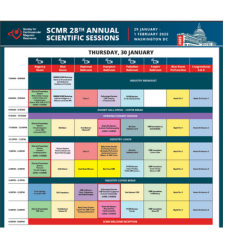Quick Fire Cases
Quick Fire 3- Cardiac Masses III
Post-Infarct Cardiac Intramural Hematoma: Parametric tissue Characterization (QF_FR_075)
Friday, January 31, 2025
8:20 AM - 8:30 AM East Coast USA Time
Location: Blue Room PreFunction - Kiosk 1
- PH
Patrick Hamcho-Milazzo, BSc
Medical Student
University of Central Florida College of Medicine - PH
Patrick Hamcho-Milazzo, BSc
Medical Student
University of Central Florida College of Medicine
Presenting Author(s)
Primary Author(s)
Description of Clinical Presentation: A 72-year-old male presented with an acute ST-segment elevation myocardial infarction (STEMI) following a delayed presentation of over 12 hours. Urgent percutaneous coronary intervention (PCI) was performed to target a thrombus in the mid-right coronary artery (RCA). Following the intervention, the patient developed post-infarct pericarditis. Cardiac MRI with T2* weighted imaging was conducted to assess the myocardial architecture and function, revealing uniform infarct patterns and iron deposition in the tissue, contributing to the diagnostic evaluation of post-MI sequelae.
Diagnostic Techniques and Their Most Important Findings: Cardiac magnetic resonance imaging (CMR) with T2* weighted imaging was employed to enhance the characterization of post-myocardial infarction (MI) complications. T2* imaging is particularly sensitive to magnetic field inhomogeneities caused by paramagnetic substances, such as iron, which allowed us to distinguish a hypointense mass within the myocardium as a hematoma rather than post-infarct edema. This advanced tissue characterization provided crucial diagnostic clarity, facilitating more accurate differentiation between post-MI sequelae. The ability to non-invasively diagnose hematoma versus edema underscores the value of T2* imaging in managing complex post-MI cases.
Learning Points from this Case: This case highlights the value of T2* weighted imaging in enhancing the diagnostic accuracy of post-myocardial infarction (MI) complications. T2* imaging allowed for precise differentiation between a hypointense mass as a hematoma versus post-infarct edema, improving the characterization of post-MI sequelae. The ability to non-invasively assess and distinguish between various post-MI complications through advanced imaging techniques provides clinicians with critical information, leading to more informed treatment strategies. This case demonstrates the significant role of T2* imaging in managing complex cardiac conditions.
Diagnostic Techniques and Their Most Important Findings: Cardiac magnetic resonance imaging (CMR) with T2* weighted imaging was employed to enhance the characterization of post-myocardial infarction (MI) complications. T2* imaging is particularly sensitive to magnetic field inhomogeneities caused by paramagnetic substances, such as iron, which allowed us to distinguish a hypointense mass within the myocardium as a hematoma rather than post-infarct edema. This advanced tissue characterization provided crucial diagnostic clarity, facilitating more accurate differentiation between post-MI sequelae. The ability to non-invasively diagnose hematoma versus edema underscores the value of T2* imaging in managing complex post-MI cases.
Learning Points from this Case: This case highlights the value of T2* weighted imaging in enhancing the diagnostic accuracy of post-myocardial infarction (MI) complications. T2* imaging allowed for precise differentiation between a hypointense mass as a hematoma versus post-infarct edema, improving the characterization of post-MI sequelae. The ability to non-invasively assess and distinguish between various post-MI complications through advanced imaging techniques provides clinicians with critical information, leading to more informed treatment strategies. This case demonstrates the significant role of T2* imaging in managing complex cardiac conditions.

